University Essay: Analyzing Transformation of Authoritarian Regimes
VerifiedAdded on 2022/09/14
|7
|1621
|11
Essay
AI Summary
This essay delves into the multifaceted transformation of authoritarian regimes, examining the interplay between state and society. It explores the characteristics of authoritarianism, including limited political pluralism, suppression of dissent, and the concentration of power, drawing on the works of scholars like Linz and Przeworski. The essay investigates the factors that trigger regime change, such as public demands for justice and the inherent flaws of authoritarian systems, highlighting instances from Egypt, Argentina, and Belarus. It further analyzes the roles of civil society, economic development, and cultural factors in shaping the outcomes of transitions, ranging from democratic consolidation to semi-authoritarian systems, referencing studies by Lipset, Treisman, and Welzel. The essay also examines the use of coercion and manipulation of information by authoritarian regimes, and concludes by emphasizing the complex and varied nature of political transitions. The essay uses the works of various scholars to support its claims.
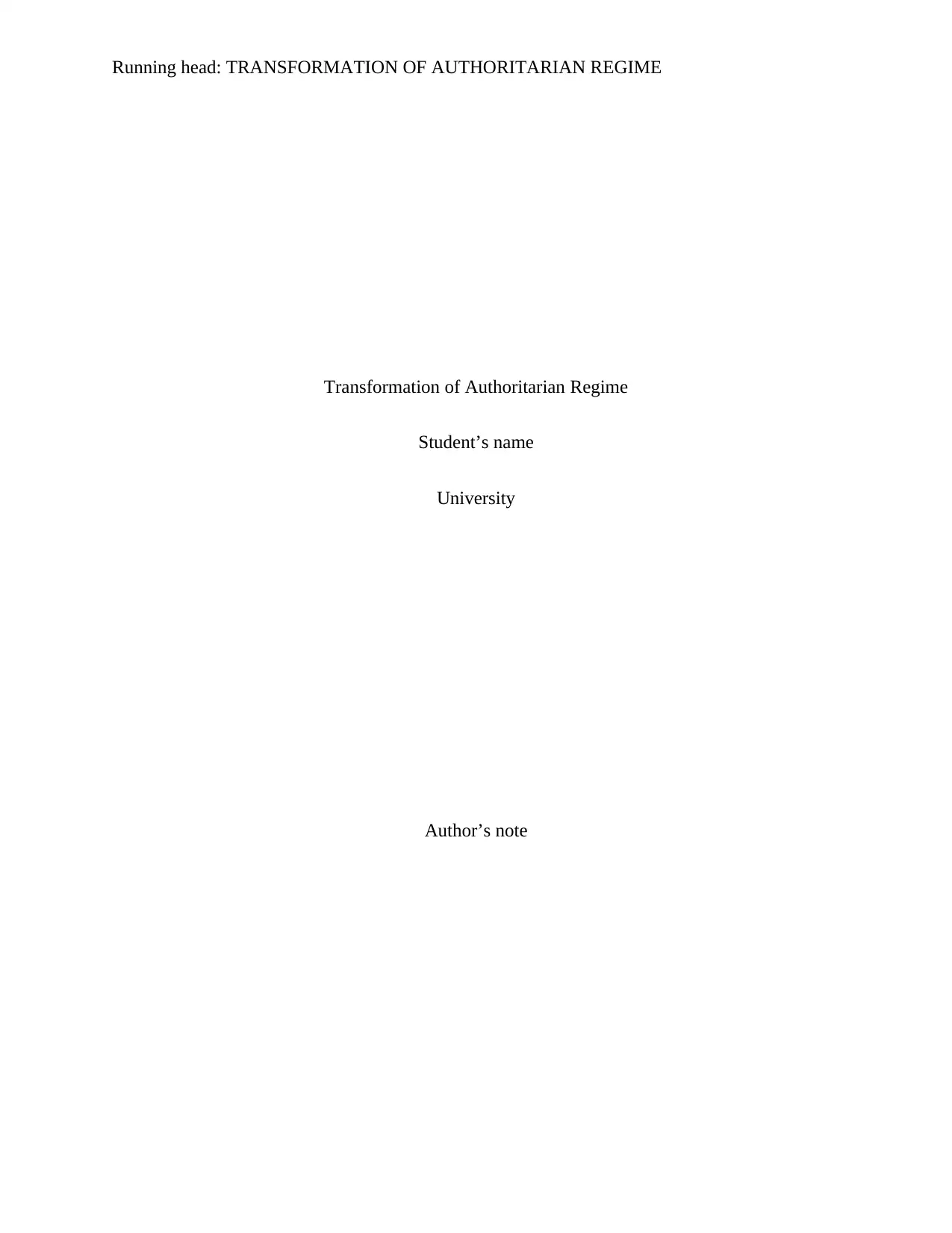
Running head: TRANSFORMATION OF AUTHORITARIAN REGIME
Transformation of Authoritarian Regime
Student’s name
University
Author’s note
Transformation of Authoritarian Regime
Student’s name
University
Author’s note
Paraphrase This Document
Need a fresh take? Get an instant paraphrase of this document with our AI Paraphraser
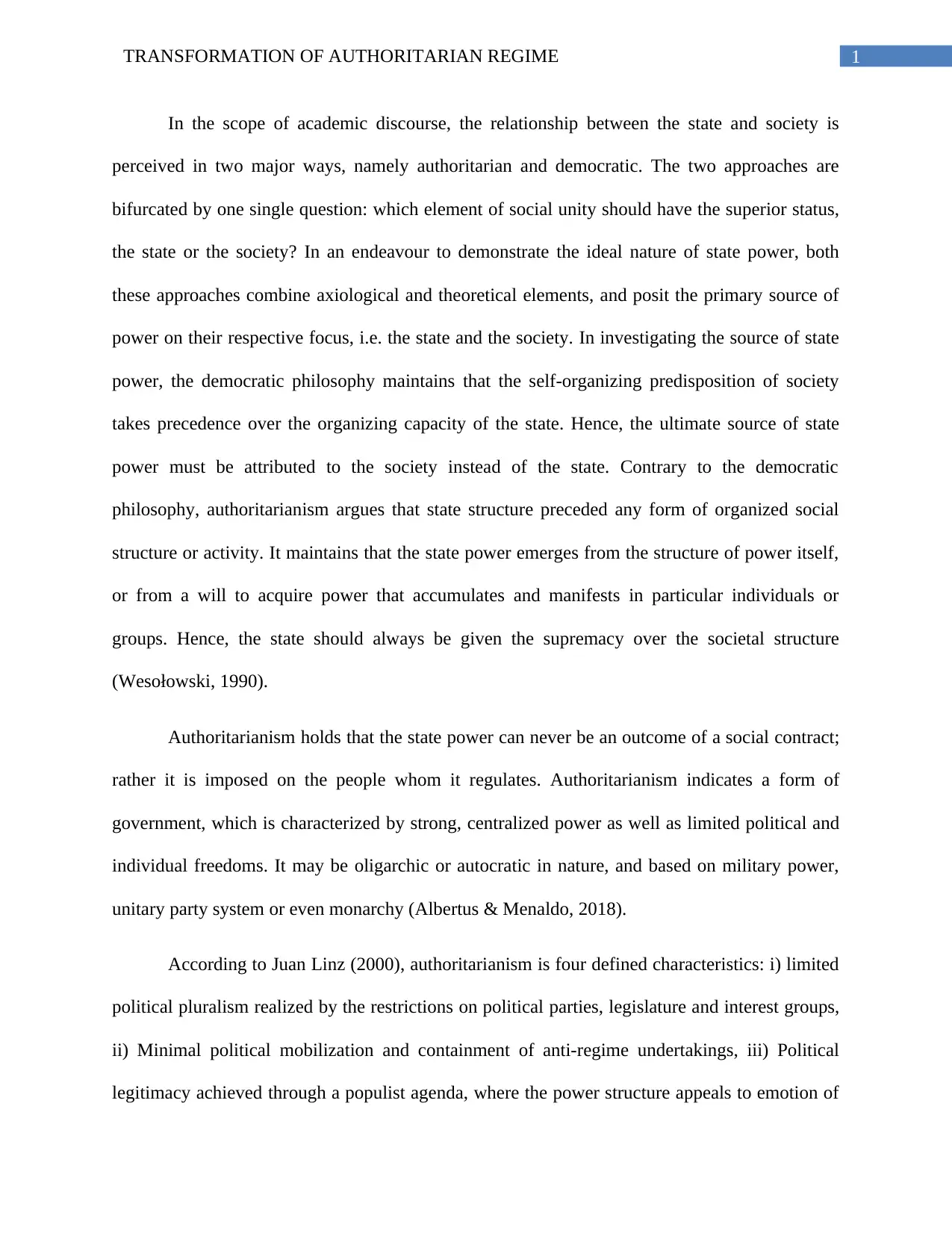
1TRANSFORMATION OF AUTHORITARIAN REGIME
In the scope of academic discourse, the relationship between the state and society is
perceived in two major ways, namely authoritarian and democratic. The two approaches are
bifurcated by one single question: which element of social unity should have the superior status,
the state or the society? In an endeavour to demonstrate the ideal nature of state power, both
these approaches combine axiological and theoretical elements, and posit the primary source of
power on their respective focus, i.e. the state and the society. In investigating the source of state
power, the democratic philosophy maintains that the self-organizing predisposition of society
takes precedence over the organizing capacity of the state. Hence, the ultimate source of state
power must be attributed to the society instead of the state. Contrary to the democratic
philosophy, authoritarianism argues that state structure preceded any form of organized social
structure or activity. It maintains that the state power emerges from the structure of power itself,
or from a will to acquire power that accumulates and manifests in particular individuals or
groups. Hence, the state should always be given the supremacy over the societal structure
(Wesołowski, 1990).
Authoritarianism holds that the state power can never be an outcome of a social contract;
rather it is imposed on the people whom it regulates. Authoritarianism indicates a form of
government, which is characterized by strong, centralized power as well as limited political and
individual freedoms. It may be oligarchic or autocratic in nature, and based on military power,
unitary party system or even monarchy (Albertus & Menaldo, 2018).
According to Juan Linz (2000), authoritarianism is four defined characteristics: i) limited
political pluralism realized by the restrictions on political parties, legislature and interest groups,
ii) Minimal political mobilization and containment of anti-regime undertakings, iii) Political
legitimacy achieved through a populist agenda, where the power structure appeals to emotion of
In the scope of academic discourse, the relationship between the state and society is
perceived in two major ways, namely authoritarian and democratic. The two approaches are
bifurcated by one single question: which element of social unity should have the superior status,
the state or the society? In an endeavour to demonstrate the ideal nature of state power, both
these approaches combine axiological and theoretical elements, and posit the primary source of
power on their respective focus, i.e. the state and the society. In investigating the source of state
power, the democratic philosophy maintains that the self-organizing predisposition of society
takes precedence over the organizing capacity of the state. Hence, the ultimate source of state
power must be attributed to the society instead of the state. Contrary to the democratic
philosophy, authoritarianism argues that state structure preceded any form of organized social
structure or activity. It maintains that the state power emerges from the structure of power itself,
or from a will to acquire power that accumulates and manifests in particular individuals or
groups. Hence, the state should always be given the supremacy over the societal structure
(Wesołowski, 1990).
Authoritarianism holds that the state power can never be an outcome of a social contract;
rather it is imposed on the people whom it regulates. Authoritarianism indicates a form of
government, which is characterized by strong, centralized power as well as limited political and
individual freedoms. It may be oligarchic or autocratic in nature, and based on military power,
unitary party system or even monarchy (Albertus & Menaldo, 2018).
According to Juan Linz (2000), authoritarianism is four defined characteristics: i) limited
political pluralism realized by the restrictions on political parties, legislature and interest groups,
ii) Minimal political mobilization and containment of anti-regime undertakings, iii) Political
legitimacy achieved through a populist agenda, where the power structure appeals to emotion of
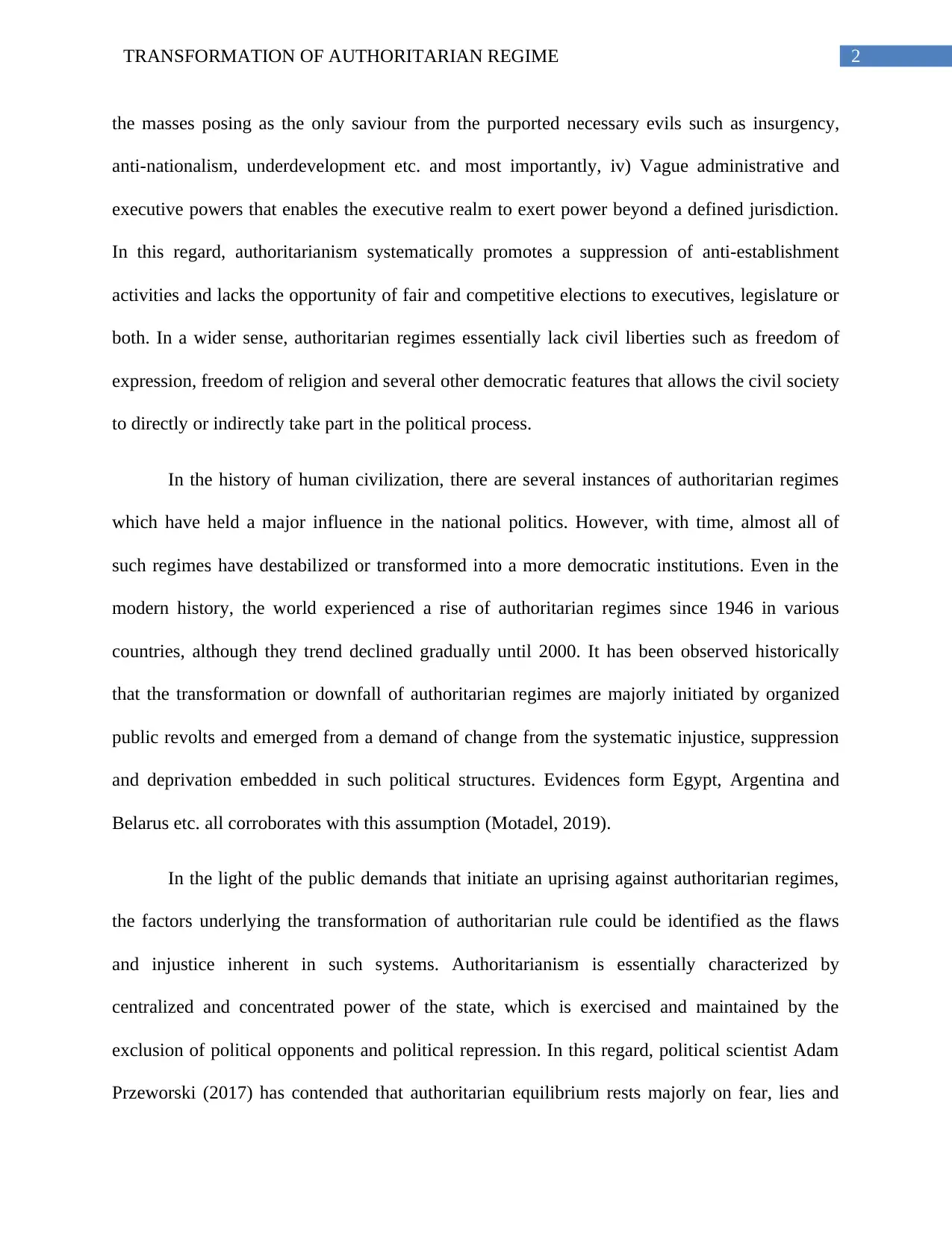
2TRANSFORMATION OF AUTHORITARIAN REGIME
the masses posing as the only saviour from the purported necessary evils such as insurgency,
anti-nationalism, underdevelopment etc. and most importantly, iv) Vague administrative and
executive powers that enables the executive realm to exert power beyond a defined jurisdiction.
In this regard, authoritarianism systematically promotes a suppression of anti-establishment
activities and lacks the opportunity of fair and competitive elections to executives, legislature or
both. In a wider sense, authoritarian regimes essentially lack civil liberties such as freedom of
expression, freedom of religion and several other democratic features that allows the civil society
to directly or indirectly take part in the political process.
In the history of human civilization, there are several instances of authoritarian regimes
which have held a major influence in the national politics. However, with time, almost all of
such regimes have destabilized or transformed into a more democratic institutions. Even in the
modern history, the world experienced a rise of authoritarian regimes since 1946 in various
countries, although they trend declined gradually until 2000. It has been observed historically
that the transformation or downfall of authoritarian regimes are majorly initiated by organized
public revolts and emerged from a demand of change from the systematic injustice, suppression
and deprivation embedded in such political structures. Evidences form Egypt, Argentina and
Belarus etc. all corroborates with this assumption (Motadel, 2019).
In the light of the public demands that initiate an uprising against authoritarian regimes,
the factors underlying the transformation of authoritarian rule could be identified as the flaws
and injustice inherent in such systems. Authoritarianism is essentially characterized by
centralized and concentrated power of the state, which is exercised and maintained by the
exclusion of political opponents and political repression. In this regard, political scientist Adam
Przeworski (2017) has contended that authoritarian equilibrium rests majorly on fear, lies and
the masses posing as the only saviour from the purported necessary evils such as insurgency,
anti-nationalism, underdevelopment etc. and most importantly, iv) Vague administrative and
executive powers that enables the executive realm to exert power beyond a defined jurisdiction.
In this regard, authoritarianism systematically promotes a suppression of anti-establishment
activities and lacks the opportunity of fair and competitive elections to executives, legislature or
both. In a wider sense, authoritarian regimes essentially lack civil liberties such as freedom of
expression, freedom of religion and several other democratic features that allows the civil society
to directly or indirectly take part in the political process.
In the history of human civilization, there are several instances of authoritarian regimes
which have held a major influence in the national politics. However, with time, almost all of
such regimes have destabilized or transformed into a more democratic institutions. Even in the
modern history, the world experienced a rise of authoritarian regimes since 1946 in various
countries, although they trend declined gradually until 2000. It has been observed historically
that the transformation or downfall of authoritarian regimes are majorly initiated by organized
public revolts and emerged from a demand of change from the systematic injustice, suppression
and deprivation embedded in such political structures. Evidences form Egypt, Argentina and
Belarus etc. all corroborates with this assumption (Motadel, 2019).
In the light of the public demands that initiate an uprising against authoritarian regimes,
the factors underlying the transformation of authoritarian rule could be identified as the flaws
and injustice inherent in such systems. Authoritarianism is essentially characterized by
centralized and concentrated power of the state, which is exercised and maintained by the
exclusion of political opponents and political repression. In this regard, political scientist Adam
Przeworski (2017) has contended that authoritarian equilibrium rests majorly on fear, lies and
⊘ This is a preview!⊘
Do you want full access?
Subscribe today to unlock all pages.

Trusted by 1+ million students worldwide
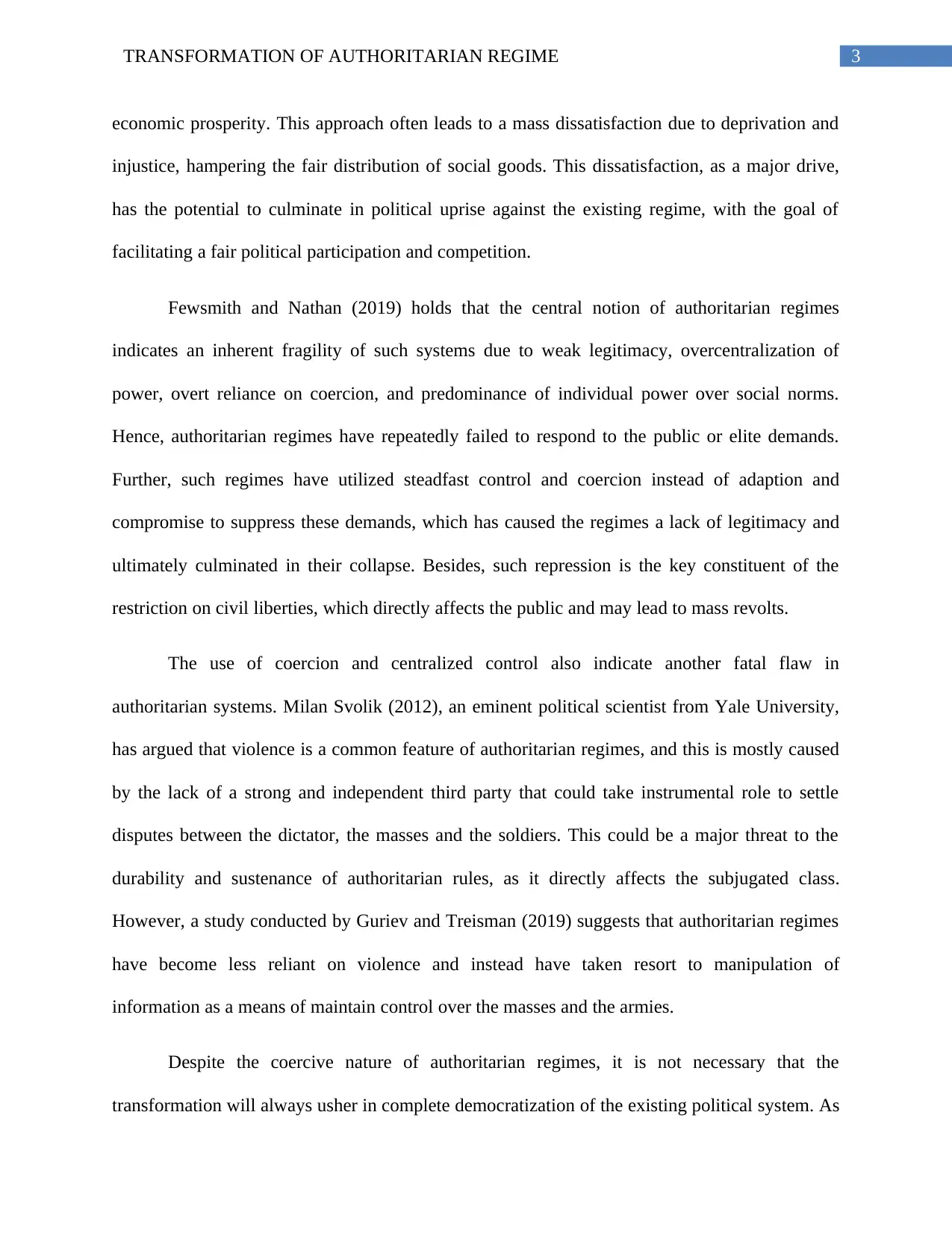
3TRANSFORMATION OF AUTHORITARIAN REGIME
economic prosperity. This approach often leads to a mass dissatisfaction due to deprivation and
injustice, hampering the fair distribution of social goods. This dissatisfaction, as a major drive,
has the potential to culminate in political uprise against the existing regime, with the goal of
facilitating a fair political participation and competition.
Fewsmith and Nathan (2019) holds that the central notion of authoritarian regimes
indicates an inherent fragility of such systems due to weak legitimacy, overcentralization of
power, overt reliance on coercion, and predominance of individual power over social norms.
Hence, authoritarian regimes have repeatedly failed to respond to the public or elite demands.
Further, such regimes have utilized steadfast control and coercion instead of adaption and
compromise to suppress these demands, which has caused the regimes a lack of legitimacy and
ultimately culminated in their collapse. Besides, such repression is the key constituent of the
restriction on civil liberties, which directly affects the public and may lead to mass revolts.
The use of coercion and centralized control also indicate another fatal flaw in
authoritarian systems. Milan Svolik (2012), an eminent political scientist from Yale University,
has argued that violence is a common feature of authoritarian regimes, and this is mostly caused
by the lack of a strong and independent third party that could take instrumental role to settle
disputes between the dictator, the masses and the soldiers. This could be a major threat to the
durability and sustenance of authoritarian rules, as it directly affects the subjugated class.
However, a study conducted by Guriev and Treisman (2019) suggests that authoritarian regimes
have become less reliant on violence and instead have taken resort to manipulation of
information as a means of maintain control over the masses and the armies.
Despite the coercive nature of authoritarian regimes, it is not necessary that the
transformation will always usher in complete democratization of the existing political system. As
economic prosperity. This approach often leads to a mass dissatisfaction due to deprivation and
injustice, hampering the fair distribution of social goods. This dissatisfaction, as a major drive,
has the potential to culminate in political uprise against the existing regime, with the goal of
facilitating a fair political participation and competition.
Fewsmith and Nathan (2019) holds that the central notion of authoritarian regimes
indicates an inherent fragility of such systems due to weak legitimacy, overcentralization of
power, overt reliance on coercion, and predominance of individual power over social norms.
Hence, authoritarian regimes have repeatedly failed to respond to the public or elite demands.
Further, such regimes have utilized steadfast control and coercion instead of adaption and
compromise to suppress these demands, which has caused the regimes a lack of legitimacy and
ultimately culminated in their collapse. Besides, such repression is the key constituent of the
restriction on civil liberties, which directly affects the public and may lead to mass revolts.
The use of coercion and centralized control also indicate another fatal flaw in
authoritarian systems. Milan Svolik (2012), an eminent political scientist from Yale University,
has argued that violence is a common feature of authoritarian regimes, and this is mostly caused
by the lack of a strong and independent third party that could take instrumental role to settle
disputes between the dictator, the masses and the soldiers. This could be a major threat to the
durability and sustenance of authoritarian rules, as it directly affects the subjugated class.
However, a study conducted by Guriev and Treisman (2019) suggests that authoritarian regimes
have become less reliant on violence and instead have taken resort to manipulation of
information as a means of maintain control over the masses and the armies.
Despite the coercive nature of authoritarian regimes, it is not necessary that the
transformation will always usher in complete democratization of the existing political system. As
Paraphrase This Document
Need a fresh take? Get an instant paraphrase of this document with our AI Paraphraser
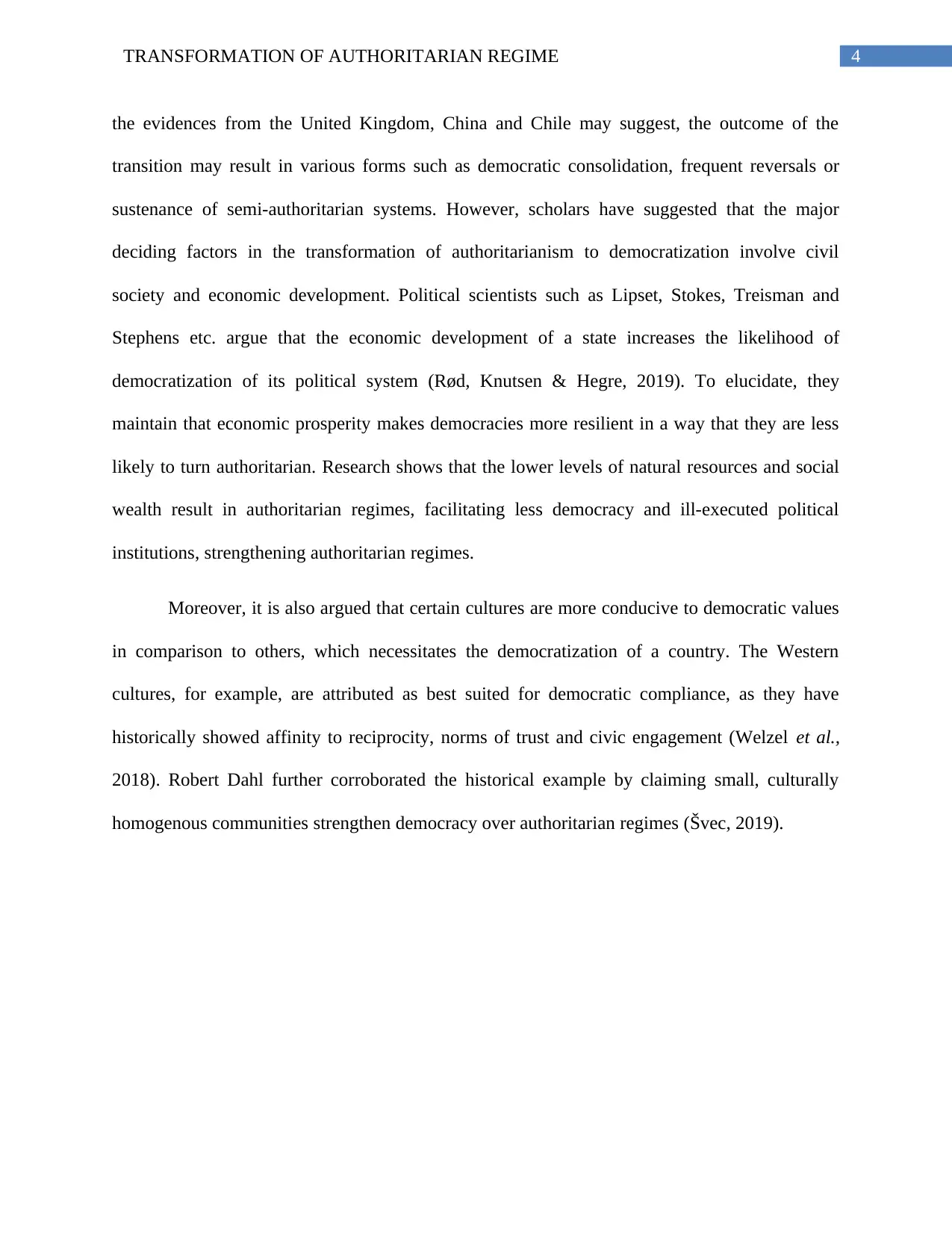
4TRANSFORMATION OF AUTHORITARIAN REGIME
the evidences from the United Kingdom, China and Chile may suggest, the outcome of the
transition may result in various forms such as democratic consolidation, frequent reversals or
sustenance of semi-authoritarian systems. However, scholars have suggested that the major
deciding factors in the transformation of authoritarianism to democratization involve civil
society and economic development. Political scientists such as Lipset, Stokes, Treisman and
Stephens etc. argue that the economic development of a state increases the likelihood of
democratization of its political system (Rød, Knutsen & Hegre, 2019). To elucidate, they
maintain that economic prosperity makes democracies more resilient in a way that they are less
likely to turn authoritarian. Research shows that the lower levels of natural resources and social
wealth result in authoritarian regimes, facilitating less democracy and ill-executed political
institutions, strengthening authoritarian regimes.
Moreover, it is also argued that certain cultures are more conducive to democratic values
in comparison to others, which necessitates the democratization of a country. The Western
cultures, for example, are attributed as best suited for democratic compliance, as they have
historically showed affinity to reciprocity, norms of trust and civic engagement (Welzel et al.,
2018). Robert Dahl further corroborated the historical example by claiming small, culturally
homogenous communities strengthen democracy over authoritarian regimes (Švec, 2019).
the evidences from the United Kingdom, China and Chile may suggest, the outcome of the
transition may result in various forms such as democratic consolidation, frequent reversals or
sustenance of semi-authoritarian systems. However, scholars have suggested that the major
deciding factors in the transformation of authoritarianism to democratization involve civil
society and economic development. Political scientists such as Lipset, Stokes, Treisman and
Stephens etc. argue that the economic development of a state increases the likelihood of
democratization of its political system (Rød, Knutsen & Hegre, 2019). To elucidate, they
maintain that economic prosperity makes democracies more resilient in a way that they are less
likely to turn authoritarian. Research shows that the lower levels of natural resources and social
wealth result in authoritarian regimes, facilitating less democracy and ill-executed political
institutions, strengthening authoritarian regimes.
Moreover, it is also argued that certain cultures are more conducive to democratic values
in comparison to others, which necessitates the democratization of a country. The Western
cultures, for example, are attributed as best suited for democratic compliance, as they have
historically showed affinity to reciprocity, norms of trust and civic engagement (Welzel et al.,
2018). Robert Dahl further corroborated the historical example by claiming small, culturally
homogenous communities strengthen democracy over authoritarian regimes (Švec, 2019).
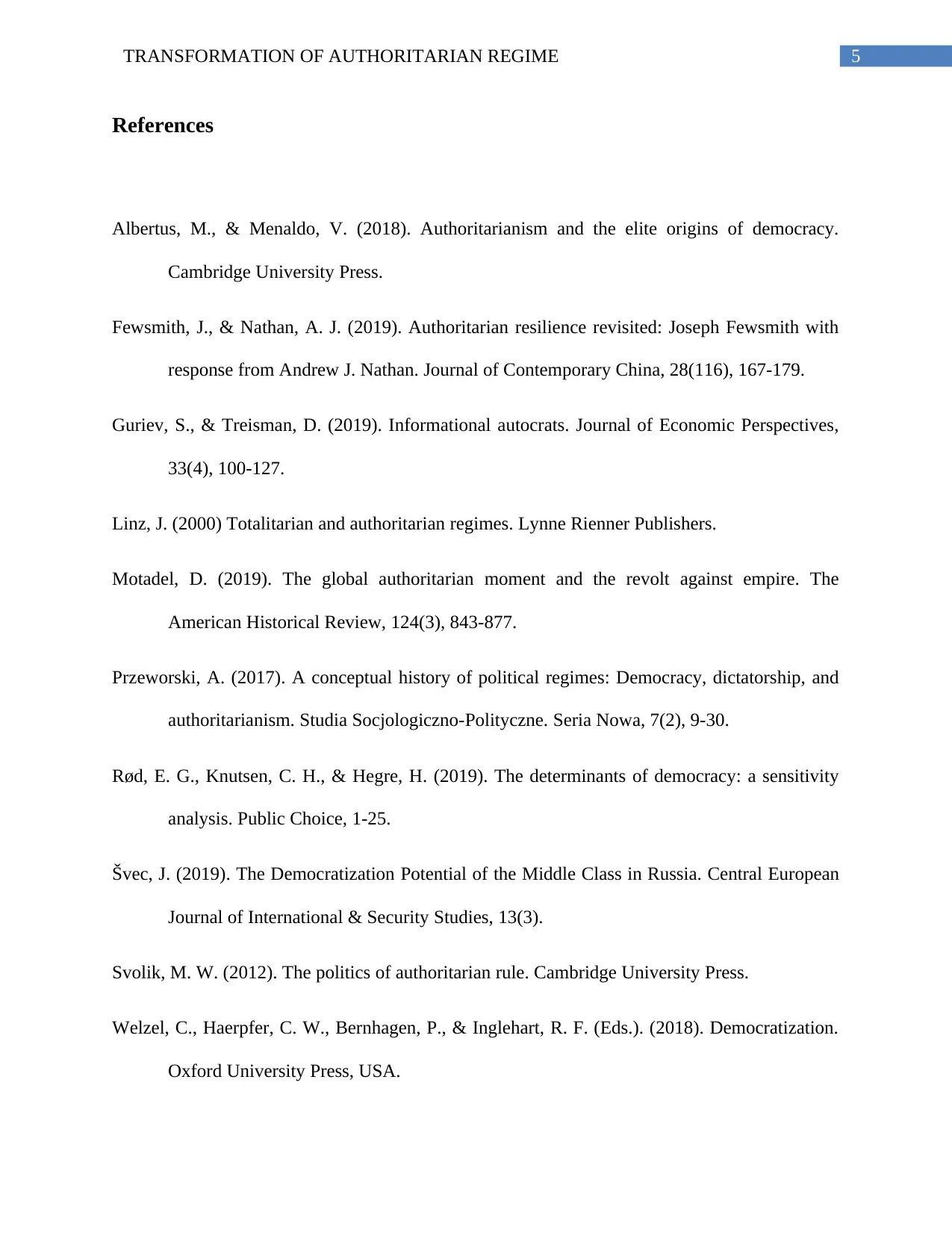
5TRANSFORMATION OF AUTHORITARIAN REGIME
References
Albertus, M., & Menaldo, V. (2018). Authoritarianism and the elite origins of democracy.
Cambridge University Press.
Fewsmith, J., & Nathan, A. J. (2019). Authoritarian resilience revisited: Joseph Fewsmith with
response from Andrew J. Nathan. Journal of Contemporary China, 28(116), 167-179.
Guriev, S., & Treisman, D. (2019). Informational autocrats. Journal of Economic Perspectives,
33(4), 100-127.
Linz, J. (2000) Totalitarian and authoritarian regimes. Lynne Rienner Publishers.
Motadel, D. (2019). The global authoritarian moment and the revolt against empire. The
American Historical Review, 124(3), 843-877.
Przeworski, A. (2017). A conceptual history of political regimes: Democracy, dictatorship, and
authoritarianism. Studia Socjologiczno-Polityczne. Seria Nowa, 7(2), 9-30.
Rød, E. G., Knutsen, C. H., & Hegre, H. (2019). The determinants of democracy: a sensitivity
analysis. Public Choice, 1-25.
Švec, J. (2019). The Democratization Potential of the Middle Class in Russia. Central European
Journal of International & Security Studies, 13(3).
Svolik, M. W. (2012). The politics of authoritarian rule. Cambridge University Press.
Welzel, C., Haerpfer, C. W., Bernhagen, P., & Inglehart, R. F. (Eds.). (2018). Democratization.
Oxford University Press, USA.
References
Albertus, M., & Menaldo, V. (2018). Authoritarianism and the elite origins of democracy.
Cambridge University Press.
Fewsmith, J., & Nathan, A. J. (2019). Authoritarian resilience revisited: Joseph Fewsmith with
response from Andrew J. Nathan. Journal of Contemporary China, 28(116), 167-179.
Guriev, S., & Treisman, D. (2019). Informational autocrats. Journal of Economic Perspectives,
33(4), 100-127.
Linz, J. (2000) Totalitarian and authoritarian regimes. Lynne Rienner Publishers.
Motadel, D. (2019). The global authoritarian moment and the revolt against empire. The
American Historical Review, 124(3), 843-877.
Przeworski, A. (2017). A conceptual history of political regimes: Democracy, dictatorship, and
authoritarianism. Studia Socjologiczno-Polityczne. Seria Nowa, 7(2), 9-30.
Rød, E. G., Knutsen, C. H., & Hegre, H. (2019). The determinants of democracy: a sensitivity
analysis. Public Choice, 1-25.
Švec, J. (2019). The Democratization Potential of the Middle Class in Russia. Central European
Journal of International & Security Studies, 13(3).
Svolik, M. W. (2012). The politics of authoritarian rule. Cambridge University Press.
Welzel, C., Haerpfer, C. W., Bernhagen, P., & Inglehart, R. F. (Eds.). (2018). Democratization.
Oxford University Press, USA.
⊘ This is a preview!⊘
Do you want full access?
Subscribe today to unlock all pages.

Trusted by 1+ million students worldwide
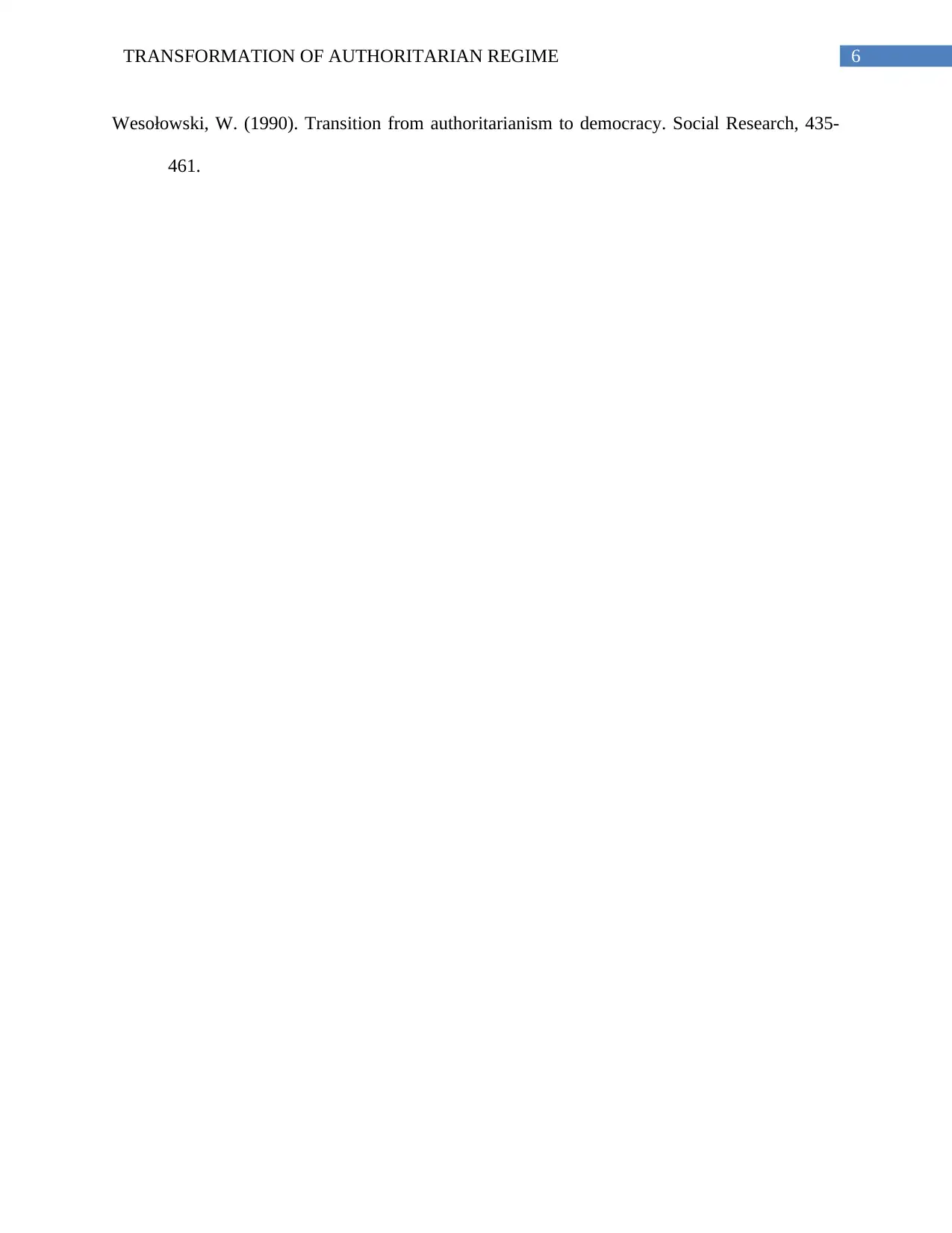
6TRANSFORMATION OF AUTHORITARIAN REGIME
Wesołowski, W. (1990). Transition from authoritarianism to democracy. Social Research, 435-
461.
Wesołowski, W. (1990). Transition from authoritarianism to democracy. Social Research, 435-
461.
1 out of 7
Related Documents
Your All-in-One AI-Powered Toolkit for Academic Success.
+13062052269
info@desklib.com
Available 24*7 on WhatsApp / Email
![[object Object]](/_next/static/media/star-bottom.7253800d.svg)
Unlock your academic potential
Copyright © 2020–2026 A2Z Services. All Rights Reserved. Developed and managed by ZUCOL.





